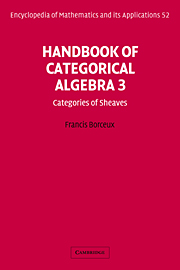1 - Locales
Published online by Cambridge University Press: 04 February 2010
Summary
A topological space is built up from points and open subsets. But in some sense, open subsets are much more essential than points. Indeed, knowing the points of the space does not give any information on the topology. On the other hand, the lattice of open subsets very often characterizes at the same time the set of points. For example in a Hausdorff space, the points of the space can be characterized as the atoms of the lattice of closed subsets, which is just the dual of the lattice of open subsets.
A locale is just a lattice which mimics the properties of the lattice of open subsets of a topological space. Locales appear very naturally when studying sheaves (see chapters 2, 3) and, even when studying sheaves on a topological space, many constructions lead to the consideration of locales which are no longer isomorphic to the lattice of open subsets of a space.
But besides generalizing nicely the notion of topological space, locales are important for a completely different reason: they satisfy all the axioms of intuitionistic propositional calculus, i.e., roughly speaking, the classical propositional calculus without the law of excluded middle. This last remark will turn out to grow in importance through the remaining chapters of this book. We shall start by making more precise this reference to intuitionistic logic.
- Type
- Chapter
- Information
- Handbook of Categorical Algebra , pp. 1 - 86Publisher: Cambridge University PressPrint publication year: 1994



